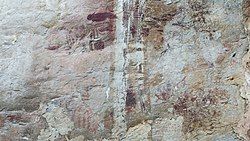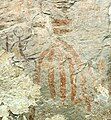Tambun rock art
| Tambun rock art | |
|---|---|
 Series of cave paintings at Gua Panjang | |
| Location | Tambun, Ipoh, Perak, Malaysia |
| Coordinates | 4°36′07″N 101°07′50″E / 4.602°N 101.1305°E |
| Discovery | 1959 |
| Geology | Limestone |
Tambun rock art, is a series of Neolithic-era cave paintings at the Gunung Panjang limestone hill in Tambun, on the outskirts of Ipoh, Perak, Malaysia. The paintings were discovered on a rocky overhang in 1959[1] by 2/Lt R. L. Rawlings of the 2nd Battalion, 6th Queen Elizabeth's Own Gurkha Rifles. Popularly known as the "Tambun Cave Paintings" (Lukisan Gua Tambun in Malay), the paintings could have been made by the ancestors of the Orang Asli and had spiritual importance.[2][3] This site should not be confused with Gunung Tambun, another limestone hill that is found several kilometres to the north of Gunung Panjang.[4]
Description
[edit]The Tambun rock art is on a prominent rockface on the west face of Gunung Panjang, a large karstic hill, nearly 2 kilometres long, overlooking Ipoh and the Kinta valley. The hill comprises light grey marble belonging to the Devonian limestone of the Kinta Valley.[5] The Tambun rock art site is the largest display of neolithic paintings in Asia. They are estimated to be between 2,000[6] and 12,000 years old.[7] The paintings were probably made using haematite.[6] At the time of the discovery, the wide shelf at the base of the rock face was littered deep with empty, conical snail shells, all with their tips knocked off. The site is not easily accessible to tourists as the path is overgrown and muddy and there is a steep flight of steps up to the site.[7]
Gallery
[edit]-
Canine figure
-
Deer figure
-
Human figure
-
Herd of animals
-
Path below the paintings
-
Entrance leading to the site
References
[edit]- ^ Matthews, J (1960). "A note on the rock paintings recently discovered near Ipoh, Perak". Man. 60: 1–3. doi:10.2307/2797896. JSTOR 2797896.
- ^ Goh Hsiao Mei. "Tambun Rock Art". Tambun Rock Art. Centre for Global Archaeological Research, University Sains Malaysia, Penang. Retrieved 18 September 2020.
- ^ Khoo, Salma Nasution; Lubis, Abdur-Razzaq (2005). Kinta Valley: Pioneering Malaysia's Modern Development. Areca Books. p. 352. ISBN 9789834211301.
- ^ "Gunung Tambun at GeoNames.org". www.geonames.org. Retrieved 2020-12-05.
- ^ Mohd Shafeea Leman; Mokhtar Saidin; Islahuda Hani Sahak (2013). "The Occurrence of Pre-historic Kitchen Wastes at Gunung Panjang, Ipoh, Perak and Their Bearings on the Age of the Gua Tambun Pre-historic Rock Paintings". Proceedings of the National Geoscience Conference 2013.
- ^ a b "Gua Badak: Cave art from the past | The Star Online". www.thestar.com.my. Retrieved 2020-03-05.
- ^ a b Kumaran, Loghun. "Perak govt plans to shut access to prehistoric Gua Tambun rock paintings | Malay Mail". www.malaymail.com. Retrieved 2020-03-05.






